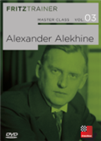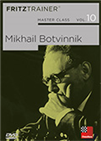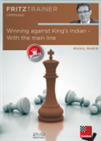Vlastimil Hort: Don't forget the humour!
Do chess players have a sense of humour? As far as I know there are no serious medical studies giving an answer to this question. Our chess playing homo ludens is usually a self-critical masochist, perhaps even with a touch of sadism. He likes to get a brain-massage and likes it even better to treat others to one. The cave dwellers threw bones, the homo ludens of today enjoys more comfort — he throws dice and plays Black Jack at the casino. But reasonable people do not let themselves be tempted by gambling but play chess instead!
The famous movie "One Flew Over the Cuckoo's net" by Milos Forman (incidentally, a Czech) takes place in a mental institution and the new patient Randle MacMurphy — played by Jack Nicholson with bravura — is difficult to control. He wants to give the inmates of the "loony bin" a little joy of life and comes up with a number of funny entertainments and tempts the whole ward to play poker. And even though they only play for matches everybody has a lot of fun. Forman also had plans for a film about the Fischer vs Spassky match in Reykjavik 1972. What a pity that this project was abandoned after some preliminary talks! The result would certainly have been better than the American adaptation "Pawn Sacrifice".
Laughter and humour are very healthy and after a loss, they might help to bring things back to normal. "The most important trait of a chess player is a kind of very weird humour!", Tony Miles said.
When I come home from my games, my dear Brigitte only needs to see how I walk and look to know how I played: "Did you lose?" she still asks, hoping I did not. I desperately try to find my humour back: "Well, you know that I am a complete idiot with a special talent."
"A glass of wine and spaghetti à la maison always help," she then tries to console me. And it usually helps.
Hort-Spassky. We often faced each other at the chess board. I know all of Boris' grimaces and thus can interpret his face during a game. In a tournament game, in which two opponents face each other under the "hardest" conditions a relationship develops that is, for example, more intense than the one with a neighbour whom you might see more often but without intense feelings. Good morning, good evening — that's usually all.
How to get back in shape as quickly as possible after making errors in chess? Not an easy question. There are many recipes. My proposal: "Make your moves as if you would caress a cat. From head to tail, never the other way because if you brush a cat the wrong way you have to take its dangerous claws into account!"
Grandmaster Ludek Pachmann wrote in his memoirs: "My wins in the Easter Tournament in Prague 1943 brought me the approval of World Champion Alekhine, and after each round, I was usually invited to his hotel suite to analyse. Unfortunately, the Siamese cat of Madame Alekhine did not like me very much. Which led to a few solid scratches."
Who knows? Maybe the cat did not like his moves!
 The name Emanuel Lasker will always be linked with his incredible 27 years reign on the throne of world chess. In 1894, at the age of 25, he had already won the world title from Wilhelm Steinitz and his record number of years on the throne did not end till 1921 when Lasker had to accept the superiority of Jose Raul Capablanca. But not only had the only German world champion so far seen off all challengers for many years, he had also won the greatest tournaments of his age, sometimes with an enormous lead. The fascinating question is, how did he manage that?
The name Emanuel Lasker will always be linked with his incredible 27 years reign on the throne of world chess. In 1894, at the age of 25, he had already won the world title from Wilhelm Steinitz and his record number of years on the throne did not end till 1921 when Lasker had to accept the superiority of Jose Raul Capablanca. But not only had the only German world champion so far seen off all challengers for many years, he had also won the greatest tournaments of his age, sometimes with an enormous lead. The fascinating question is, how did he manage that?
Drawing: Otakar Masek
A well-known conflict occurred during a game between Nimzowitsch and Lasker.
Back then the FIDE had not yet forbidden to smoke at the board. Nimzowitsch, the master of blockade, went to the arbiter to complain about Lasker. Why? On the playing table, in front of World Champion Lasker, who loved Havana cigars from Cuba, was an empty ashtray. "But I do not smoke!", Lasker parried the complaint. "You threaten to smoke!", replied Nimzowitsch, "that is much worse!"
Yes, in a game of chess the threat is indeed often stronger than its execution. There are two kinds of threats. The first kind just makes you laugh silently. And the "real" one which you must respect and parry.
In most European countries the chess season starts in the second half of October, but the French start the "Beaujolais Primeur" always on the third Thursday in November.
After losing a game I sometimes cannot believe that I was the one who made all the stupid and losing moves.
Should bad luck have it — which I can hardly believe — that you lose your first game in the coming season, and your team the match, I would like to offer my First-Aid-kit from my box of anecdotes under the heading "Don't worry, be happy..." And don't forget, the "Beaujolais Primeur" is excellent and helps a lot!
A night of magnetism
April 1968 I had the chance to visit Monaco for the first time in my life. The tournament I played in took place right in the middle of Monte Carlo, at that time already one of the most popular locations for the European jet set. Used to the frugality of Czechoslovakian socialism I almost could not believe my eyes when I saw all the luxury.
Final standings
 On this DVD GMs Rogozenco, Marin, Müller, and IM Reeh present outstanding games, stunning combinations and exemplary endgames by Alekhine. And they invite you to improve your knowledge with the help of video lectures, annotated games and interactive tests
On this DVD GMs Rogozenco, Marin, Müller, and IM Reeh present outstanding games, stunning combinations and exemplary endgames by Alekhine. And they invite you to improve your knowledge with the help of video lectures, annotated games and interactive testsIn round six I had to play Larsen. My opponent was in splendid form. After five hours of play it was time to adjourn and to seal a move. Very confident and in less than three minutes Larsen gave the arbiter the envelope with his move. I was a pawn down and had no appetite for dinner but rather wanted to analyse the position as fast as possible on my small magnetic chess board.

Drawings: Otakar Masek
Which move did my opponent seal? He basically had only two choices, 44. e4-e5 or 44. f4-f5. Even after analysing for hours I was not sure which move was stronger. Finally, I was too tired to continue. A nice little bath to relax was just what I needed. I filled my comfortable bathtub with warm water and stepped into the white foam, chess board in one hand, a pot of hot tea in the other.
"Where am I, what time is it?" These were my first thoughts when I woke up in ice-cold water in the morning. The magnetic chess pieces were floating around me, the chess board had sunk to the ground of the bathtub and the remains of the ceramic tea pot were scattered on the bathroom floor.
"Come on, Vlasti, get out of the water and get down to work!" I suddenly realised that I had an adjournment to play and still did not know whether 44. e4-e5 or 44. f4-f5 was the right breakthrough for Larsen.
At exactly eight o'clock in the morning, my telephone was ringing. Who disturbed my concentration? The answer is given in the following anecdote…
When the telephone call was over I had to hurry. I was starving and grabbed my magnetic board and ran to the breakfast buffet.
And I was lucky! Bent Larsen had sealed the weaker move and my "bathtub analysis" helped me to save the game.
But what happened to magnetic chess boards? They are inexpensive, easy to use and, most importantly, they do not need a battery!
The intruder
The telephone was ringing — just when I was trying to find the best counter to the moves Larsen might have sealed and I had finally recovered my senses after the long bathtub night.
Who would call me here in Monte Carlo, who might that be? Certainly no one from home, or? It was a big surprise indeed! Mikhail Moiseevich Botvinnik was at the other end of the phone. "If you want to visit me in my room, I could show you some lines in your adjourned game," I heard a Russian voice saying.
 Our experts show, using the games of Botvinnik, how to employ specific openings successfully, which model strategies are present in specific structures, how to find tactical solutions and rules for how to bring endings to a successful conclusion
Our experts show, using the games of Botvinnik, how to employ specific openings successfully, which model strategies are present in specific structures, how to find tactical solutions and rules for how to bring endings to a successful conclusion
As someone living in a state of the Warsaw Pact, I, of course, understood the language perfectly but I was shocked! I knew immediately what he had in mind but what kind of offer was that? My personal chess code forbade me to accept help from Larsen's rivals and I also would have thought it unfair to offer my help to another player in the tournament.
Botvinnik was my chess idol and before playing in Monaco he had announced that this would be his last tournament. But I still consider the offer the legendary former World Champion made to be outrageous.
I answered in my best Russian and was more than clear: "This might be common practice in the USSR but in the civilised world it is not. If this is going to be your last tournament you should have honour enough to win it with your own efforts! I am very disappointed by you, Mr. Botvinnik!"
No, I have never been a Soviet vassal and my Czechoslovakia has never been a Soviet province. Former World Champion here, former World Champion there. And later I had the thought that Botvinnik, a well-known supporter of Stalin, would certainly have sent tanks to Prague in August 1968 "to help among brothers".
Botvinnik smashed the telephone back on the cradle. He did not win the tournament. He was 57 years old and still a world class player, and finished on an excellent second place.
At any rate, our "relationship" ended with the telephone conversation. Though we had to play in round eight of this tournament — which is the topic of the next anecdote…
No answer is also an answer
For me, it was quite an event to play against a living chess legend. I was only 24 years old and at the beginning of my chess career.
 In the classical system of the King's Indian White develops naturally and refrains from chasing ghosts looking for a refutation of Black's set-up. White instead relies on the fact that natural play should yield him a small but lasting advantage.
In the classical system of the King's Indian White develops naturally and refrains from chasing ghosts looking for a refutation of Black's set-up. White instead relies on the fact that natural play should yield him a small but lasting advantage.After our unfortunate encounter on the telephone, I made up my mind to simply forget the "clash" and to start the first contact with Botvinnik at the board correctly and without any burden. Freshly shaved and with a tie which is usually not part of my attire I entered the tournament hall, went to my table and sat down a few minutes before the game began.
My famous opponent arrived with his even more famous thermos flask almost with the gong. He did not greet me and did not even throw a single glance at me when sitting down. He skipped the customary handshake before the game and made his first move as if he was sitting opposite a ghost.
I had the black pieces and decided to play the King's Indian but that was not the best choice. I liked his position better but time-trouble always favours the younger generation, and our game was no exception. With only a little time left his moves were not faultless and in an equal position that was approaching the endgame, I took the liberty to offer a draw after my 27th move. Following FIDE rules I submitted it exactly with my move, in English and also in Russian to be on the safe side. Then I pressed the clock. I had about five minutes remaining on the clock. Botvinnik had a little less. Would he accept my offer? Botvinnik silently made his next move.
No answer is also an answer. I had an easy game, no problems in sight. Just a quick visit to the bathroom and then even quicker back to the board. Where a surprise was waiting for me — the former World Champion was nowhere to be seen. But his forlorn scoresheet was lying on the table, signed by Botvinnik: ½-½.
The French arbiter who had followed the scene very attentively approached me immediately. He spoke flawless English and told me: "Mr. Hort, if you want to protest, you will win." After thinking for a short time I took my pen and signed the draw without saying anything. However, my idol had lost a lot of his splendour.
At the winner's ceremony, I told Larsen the whole story. "Don't worry, Vlastimil, I do analyse much better and would have won the tournament anyway!"
Translation from German: Johannes Fischer
Links
























